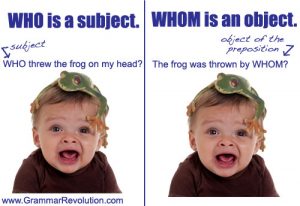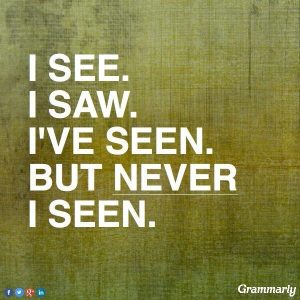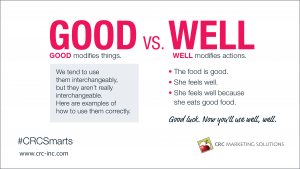(When I was teaching journalism at the University of Illinois, I used to give this handout on Respecting the Language: 80 Do’s and Don’ts to the Reporting 400 class I taught. Students told me they found it helpful. Here it is for those of you who write or who are contemplating writing. The list, by no means complete, nevertheless contains words often misused by writers. What follows are a few of the worst offenders, with explanations for avoiding these common grammatical and syntactical traps. I hope you find it useful)
- Accept, Except. ACCEPT: To receive or approve. EXCEPT: to omit or to object to, as a verb; with exclusion, as a preposition.
- Affect, Effect. Generally AFFECT is the verb; EFFECT is the noun. “The letter did not AFFECT the outcome.” But the “letter had a significant EFFECT.” AFFECT means to influence. EFFECT as a verb means to cause or bring about. Thus: “It is almost impossible to EFFECT change.”
- After and Following. As a preposition, AFTER is preferred. “He answered questions AFTER his speech.”
- Afterward, Afterwards. Use AFTERWARD. The dictionary allows the use of AFTERWARDS only as a second form. The same applies to TOWARD and TOWARDS.
- Aggravate and Irritate. The preferred meaning of AGGRAVATE is to make worse or intensify. IRRITATE means to displease.
- Allude, Elude. You ALLUDE to (or mention) a book. You ELUDE (or escape) a pursuer.
- All right. That’s the way to spell it. The dictionary may list ALRIGHT as a legitimate word but it is not acceptable in standard usage.
- Annual. Don’t use first with it. If it’s the first time, it can’t be ANNUAL.
- Anxious, Eager. ANXIOUS means worried; EAGER means desirous. Usually a person is EAGER to begin a vacation, not ANXIOUS.
- Apt, Liable, Likely. Preferred meaning of APT is appropriate–an APT remark. LIABLE means accountable; LIKELY means probably.
- At, In. AT refers to a point, so it’s better to say: He died IN the hospital.
- Averse, Adverse. If you don’t like something, you are AVERSE (or opposed) to it. ADVERSE is an adjective: ADVERSE (bad) weather, ADVERSE conditions.
- Bad, Badly. Don’t say: The boy had a BAD earache. Or: The man was injured BADLY. (Is there a “good” earache or injury?) Make it a SEVERE earache and injured SEVERELY.

- Because. Use it rather than DUE TO or OWING TO, both of which are stilted. “The game was cancelled BECAUSE of rain,” not DUE TO or OWING TO rain.
- Between, Among, Amongst. Something is shared BETWEEN two persons, AMONG three or more. AMONG is always better than AMONGST, which is archaic.
- Block, Bloc. A BLOC is a coalition of persons or a group with the same purpose or goal. Don’t call it a BLOCK, which has some 40 dictionary definitions.
- Burglary, Robbery, and Holdup. BURGLARY means to enter a building with intent to commit a felony. ROBBERY is to take property from a person with force or threat of force. HOLDUP is a synonym for ROBBERY or ARMED ROBBERY, but NOT for BURGLARY.
- Capital, Capitol. CAPITAL is the city; CAPITOL the building.
- Claim. Don’t use CLAIM for SAID or INSIST. CLAIM means to assert ownership: He CLAIMED his book.
- Collide, Strike. For there to be a COLLISION, both objects must be in motion. So, two moving cars COLLIDE, but a car STRIKES a tree.
- Common, Mutual. Jones and Smith have a COMMON dislike for Allen. (Allen may not even be aware of it.) Cooke and Brown have a MUTUAL dislike for each other. The feeling is reciprocal.
- Compose, Comprise, Include. You COMPOSE things by putting them together. Once the parts are put together, the object COMPRISES or INCLUDES or embraces the parts. Comprise is used in the active voice: A knife, fork and spoon COMPRISE the set. COMPOSE is used in the passive voice. The set is COMPOSED of knife, fork and spoon. INCLUDE, preferably, not all parts of the whole: The set INCLUDES a knife and fork.
- Continual, Continuous. CONTINUAL means recurring at brief intervals but never really stopping. CONTINUOUS means to occur without any interruption at all.
- Couple of. You need the OF. It’s never “a couple tomatoes.”
- Dates from. Something DATES from, not BACK to.
- Demolish, Destroy. They mean to do away with completely. You can’t partially DEMOLISH or DESTROY something, nor is there any need to say totally DESTROYED.
- Deny, Refute. DENY has two preferred meanings: (1) to withhold something and (2) simply a negative response to an accusation. REFUTE means to destroy an argument, either by reasoning alone or with evidence; a fairly close synonym for DISPROVE, but not for DENY.
- Different from. Things and people are different FROM each other. Don’t write that they are different THAN each other.
- Drown, Drowned. Don’t say someone was DROWNED unless an assailant held the victim’s head underwater. Just say the victim DROWNED.
- Ecology, Environment. They are NOT synonymous. ECOLOGY is the study of the relationship between organisms and their ENVIRONMENT. RIGHT: “The laboratory is studying the ECOLOGY of man and the desert.” WRONG: “Even so simple an undertaking as maintaining a lawn affects ECOLOGY. RIGHT: “Even so simple an undertaking as maintaining a lawn affects our ENVIRONMENT.

- Either. It means one or the other, not both. WRONG: “There were lions on either side of the door.” RIGHT: “There were lions on EACH side of the door.”
- Entrant and Entry. If you’re referring to a participant in a contest, ENTRANT is preferred.
- Farther, Further. Both can be applied to distance, but only FURTHER can be used in reference to ideas or degree. Examples: “They walked FARTHER or FURTHER into the forest. They will make a FURTHER study of the problem.
- Fewer, Less. Fewer applies to numbers; less to amount or bulk. You eat fewer grapes, but less meat. If you can separate items in the quantities being compared, use FEWER. If not, use LESS. WRONG: The 49ers are inferior to the Chiefs because they have LESS fast receivers. RIGHT: The 49ers are inferior to the Chiefs because they have FEWER fast receivers. RIGHT: The 49ers are inferior to the Chiefs because they have LESS speed.
- Fliers, Flyers. Pilots are FLIERS. Handbills are FLYERS.
- Flout, Flaunt. They aren’t the same words; they mean completely different things and they’re very commonly confused. FLOUT means to mock, to scoff or to show disdain for. FLAUNT means to display ostentatiously.
- Funeral service. A redundant expression. A FUNERAL is a service.
- Get, Obtain, Secure. GET and OBTAIN are synonyms: GET or OBTAIN a book from your friend. SECURE has two preferred meanings: To make FAST, like a door; or to SECURE a loan.
- Heart Attack, Heart Failure. A person dies of a HEART ATTACK or HEART DISEASE, not HEART FAILURE.
- Head up. People don’t HEAD UP committees. They HEAD them.
- Hopefully. Hope. One of the most commonly misused words, in spite of what the dictionary may say. HOPEFULLY should describe the way a subject FEELS. For example: HOPEFULLY, I shall present the plan to the president. (This means I will be HOPEFUL when I do it.) But it is something else again when you attribute hope to a non-person. You may write: HOPEFULLY, the war will end soon. You may mean you HOPE the war will end soon, but it is not what you are writing. What you should write is: I HOPE the war will end soon.
- Imply, Infer. The speaker IMPLIES; the listener INFERS.
- In Advance, Prior To. Use BEFORE; it sounds more natural.
- It’s, Its. ITS is the possessive; IT’S is the contraction of IT IS. WRONG: What is IT’S name? RIGHT: What is ITS name? ITS name is Fido. RIGHT: IT’S the first time he’s talked tonight RIGHT: IT’S my coat.
- Last, Latest. LAST: There won’t be any more. LATEST: The most recent of a probable series.
- Lay, Lie. LAY, LAID, LAID; Transitive, taking an object. “I will LAY the book on the table.” LIE, LAY, LAIN; intransitive, no object. “The tired boy LAY on the porch yesterday.”
- Leave, Let. LEAVE ALONE means to depart from or cause to be in solitude. LET ALONE means to be undisturbed. WRONG: The man pulled a gun on her but Jones intervened and talked him into LEAVING HER ALONE. RIGHT: The man pulled a gun on her but Jones intervened and talked him into LETTING HER ALONE. RIGHT: “When I entered the room I saw that Jim and Mary were sleeping so I decided to LEAVE THEM ALONE.
- Lend, Loan as verbs. Preferred usage: LOAN applies to money; LEND, to other objects.
- Like, As. Don’t use LIKE for AS or AS IF. In general, use LIKE to compare with nouns and pronouns; use AS when comparing with phrases and clauses that contain a verb. WRONG: Jim blocks the linebacker LIKE he should. RIGHT: Jim blocks the linebacker AS he should. RIGHT: Jim blocks LIKE a pro. And PLEASE control the juvenile urge to use LIKE as some kind of a crutch in a sentence: “It was, LIKE, really cool” or “Then, we LIKE, went to Urbana.” Arrgghhh.
- Locate, Situate. A new house will be LOCATED at a certain address. Once built, it is SITUATED there. Another meaning of LOCATE is to find something for which you have been looking.
- Marshall, Marshal. Generally, the first form is correct only when the word is a proper noun: John MARSHALL. The second form is the verb form: Marilyn will MARSHAL her forces. And the second form is the one to use for a title: FIRE MARSHAL Stan Anderson; DEPUTY MARSHAL Wyatt Earp; FIELD MARSHAL Erwin Rommel.
- Media. MEDIA is the plural of MEDIUM. The MEDIA are, not is.

- Mean, Average, Median. Use MEAN as synonymous with AVERAGE. Each word refers to the sum of all components divided by the number of components. MEDIAN is the number that has as many components above it as below it–it is the middle value in a distribution of items, the point at which half of the items are above and half below. MEAN is the statisticians’ language for AVERAGE.
- Nouns. There is a growing trend toward using them as verbs. Resist it. HOST, HEADQUARTERS and AUTHOR, for example, are nouns; even though the dictionary may acknowledge they can be used as verbs. If you do, you’ll come up with a monstrosity such as: “HEADQUARTERED at his country home, John Doe HOSTED a party to celebrate the book he had just AUTHORED.” Again, Arrgghhh!
- Odd, Peculiar. ODD means strange or unusual; PECULIAR means distinctive to one person or one group, etc.
- Of, With, From. A woman is ill OF a disease, not WITH. She dies OF the disease, not FROM it.
- Oral, Verbal. Use ORAL when use of the mouth is central to the thought; the word emphasizes the idea of human utterance. VERBAL may apply to spoken or written words; it connotes the process of reducing ideas to writing. Usually, it’s a VERBAL contract, not an ORAL one, if it’s in writing.
- Over and More Than. They aren’t interchangeable. OVER refers to spatial relationships: The plane flew OVER the city. MORE THAN is used with figures: In the crowd were MORE THAN 1,000 fans. Make it MORE THAN 20 persons, not OVER. MORE THAN means in excess of; OVER means physically above.
- Parallel Construction. Thoughts in series in the same sentence require PARALLEL construction. WRONG: The union delivered demands for an increase of 10 percent in wages and to cut the workweek to 30 hours. RIGHT: The union delivered demands for an increase of 10 percent in wages and for a REDUCTION in the workweek to 30 hours.
- Part and Portion. When one is referring to a fragment of the whole, PART is preferred. PORTION more specifically means a serving of food.
- Peddle, Pedal. When selling something, you PEDDLE it. When riding a bicycle or similar form of locomotion, you PEDAL it.

- Pretense, Pretext. They’re different, but it’s a tough distinction. A PRETEXT is that which is put forward to conceal a truth. He was discharged for tardiness, but this was only a PRETEXT for general incompetence. A PRETENSE is a “false show;” a more overt act intended to conceal personal feelings. My profuse compliments were all PRETENSE.
- Principle, Principal. A guiding rule or basic truth is a PRINCIPLE. The first, dominant, or leading thing is PRINCIPAL. PRINCIPLE is a noun; PRINCIPAL may be a noun or an adjective.
- Receive, Suffer, Sustain. Make it SUFFER an injury. You can use RECEIVE, but the preferred word is SUFFER. RECEIVING and injury implies that it was a gift, which most injuries are not. The preferred meanings of SUSTAIN are to support, such as an army; or to maintain, as to SUSTAIN a drive from the 50-yard line to the opponent’s goal line.
- Redundancies to Avoid:
- Easter Sunday, Make it EASTER
- Incumbent Congressman. CONGRESSMAN.
- Owns his own home. OWNS HIS HOME.
- The company will close down. THE COMPANY WILL CLOSE.
- Jones, Smith, Johnson and Reid were all convicted. Jones, Smith, Johnson and Reid WERE CONVICTED.
- Jewish rabbi. Just RABBI.
- 8 p.m. tonight. All you need is 8 TONIGHT or 8 p.m. TODAY.
- During the winter months. DURING THE WINTER.
- Both Reid and Jones were denied pardons. Reid and Jones WERE DENIED PARDONS.
- I am currently tired. I AM TIRED.
- Autopsy to determine the cause of death. AUTOPSY (that’s what an AUTOPSY does).
- Refuse and Reject. The official REJECTED the request, not REFUSED the request. In this usage, REFUSE needs the infinitive of another verb: The official REFUSED TO GRANT the request.
- Refute. (See DENY).
- Reluctant, Reticent. If he doesn’t want to act, he is RELUCTANT. If he doesn’t want to speak, he is RETICENT.
- Say, Said. The most serviceable words in the journalist’s lexicon are the forms of the verb TO SAY. Let a person SAY something, rather than DECLARE or ADMIT or POINT OUT. And NEVER let him grin, smile, frown or giggle something.
- Sewage, Sewerage. SEWAGE means the contents of a sewer, but the community depends upon a SEWERAGE system.
- Temperatures. They may get higher or lower, but they don’t get WARMER or COOLER. WRONG: TEMPERATURES are expected to warm up in the area Friday. RIGHT: TEMPERATURES are expected to RISE in the area Friday.
- That, Which. THAT tends to restrict the reader’s thought and direct it the way you want it to go; WHICH is nonrestrictive, introducing a bit of subsidiary information. For Example: The lawnmower THAT is in the garage needs sharpening. (Meaning, we have more than one lawnmower. The one in the garage needs sharpening.) The lawnmower, WHICH is in the garage, needs sharpening. (Meaning: Our lawnmower needs sharpening. It is in the garage.) The statue, WHICH graces our entry hall, is on loan. (Meaning: Our statue is on loan. It happens to be in the entry hall.) Note that WHICH clauses take commas, signaling they are not essential to the meaning of the sentence.

- Toward and Towards. Toward is preferred.
- Try and, Try To. Only TRY TO is correct. He will TRY TO score 20 points; not TRY AND score 20 points. The term TRY AND preceding another verb is wholly superfluous: the AND makes the second verb one of accomplishment, so why TRY?
- Under way, NOT Underway. But don’t say something got under way. Say it STARTED or BEGAN.
- Unique. Something that is unique is the only one of its kind. It can’t be VERY UNIQUE or QUITE UNIQUE or SOMEWHAT UNIQUE or RATHER UNIQUE. Don’t use it unless you really mean UNIQUE.
- UP. Don’t use it with a verb. WRONG: The manager said he would UP the price next week. RIGHT: The manager said he would RAISE the price next week.
- Who, Whom. A tough one, but generally you’re safe to use WHOM to refer to someone who has been the subject of an action. WHO is the word when the somebody has been the actor. EXAMPLE: A 20-year-old woman, to WHOM the room was rented, left the window open. A 20-year-old woman, WHO rented the room, left the window open.
- Who’s, Whose. Though it incorporates an apostrophe, WHO’S is NOT a possessive. It’s a contraction for WHO IS. WHOSE is the possessive. WRONG: I don’t know WHO’S coat it is. RIGHT: I don’t know WHOSE coat it is. RIGHT: Find out WHO’S there.
- Would. Be careful about using WOULD when constructing a conditional past tense. WRONG: If Soderholm WOULD NOT HAVE HAD an injured foot, Thompson wouldn’t have been in the lineup. RIGHT: If Soderholm HAD NOT HAD an injured foot, Thompson wouldn’t have been in the lineup.
Check back Monday for another primer on writing. This one is entitled: “50 Tips on How to Write Good (Ahem)”

